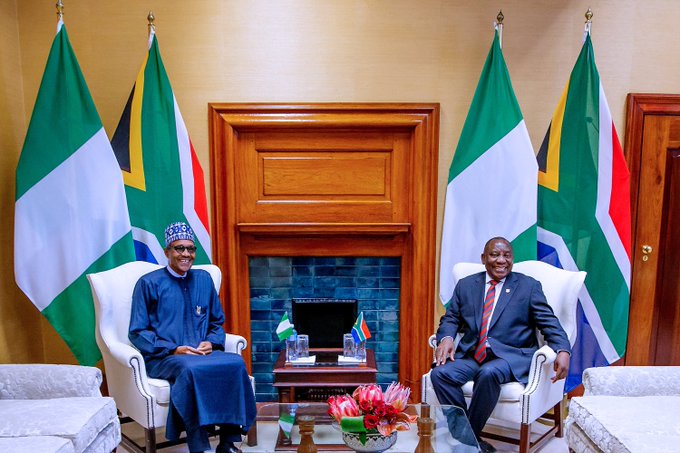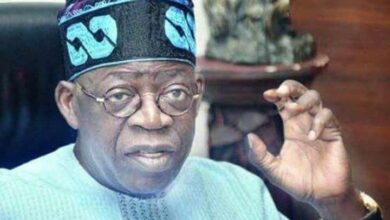Be tolerant towards other Africans, President Buhari admonishes South Africans, warns Nigerians against disrespecting host country’s laws

President Muhammadu Buhari on Thursday in Pretoria, enjoined South Africans to be more tolerant to other Africans and advised Nigerians living in the country to respect the laws of their host country.
Mallam Garba Shehu, the President’s spokesman in a statement in Abuja on Thursday, said the Nigerian leader stated this when he responded to questions during a news conference at the Union Building, alongside his host, President Cyril Ramaphosa.

He called for more tolerance, vigilance and heightened security to ensure safety of citizens, noting ”competition heralded by globalisation, especially with ease in migration, will only get more intense for businesses”.
“Police must be on alert not to allow violence to escalate,’’ he said.
President Buhari said the business world have turned out more dynamic over the years, with foreigners competing with locals in businesses that were initially considered low.
He said the panacea would only be for security agencies to show more interest in market operations, players and likely areas of tensions.
The President likened the situation of Nigerians in South Africa to Ghana where competition at low levels of the economy breeds intense competition, noting that it would keep growing with population explosion.
He told Nigerians living in various parts of the world, especially in South Africa, to adhere to the laws of the country they reside, and ensure compliance with market laws.
“Like it is said, ‘when you are in Rome behave like the Romans’. Always be law abiding,’’ he said.
Earlier in his remark, the President condemned attacks on Nigerians and the burning of their properties in South Africa, describing it as “unacceptable’’.
He also assured the South African government that their citizens and businesses in Nigeria would always be protected from harm.
He also condemned the reprisal attacks in Nigeria.
“In my discussions with President Ramaphosa and the Bi-National Commission meeting, we reviewed wide range of issues at national, regional, continental and global levels,’’ he added.
He said some of the issues were on trade, investment, mining, security, police affairs and environment.
“Our two countries have also agreed to unequivocally address the challenges in our relations including the recent people to people challenges that saw attacks against foreign nationals, including Nigerians, and their properties, which we strongly condemned,” he disclosed.
In his remarks, President Ramaphosa said the attacks on foreigners in South Africa, including Nigerians, were regrettable, assuring that his government would work hard to see an end to such attacks.
He equally condemned reprisal attacks in Nigeria.
According to him, President Buhari is the first president to embark on a state visit in South Africa since they came into power.
“We will work together to promote cohesion and best values. What happened did not reflect our values.
“We both condemn the attacks and the reprisal in strongest terms. We will set up mechanisms for early signals,’’ he said.
Ramaphosa said his country would also create a more enabling environment for Nigerian businesses to thrive in South Africa, acknowledging that more South African companies operate in Nigeria.
He, however, observed that Nigerians were mostly in Small and Medium Scale sectors in his country.
“We have large corporations operating in Nigeria while you have small and medium enterprises from Nigeria here in South Africa,” he said.
He promised to deepen the reforms in his country to open the space for more Nigerian business to “address the imbalance”.
“The rule of law must be obeyed by all citizens. Nigerians in South Africa must obey the rule of law, while South Africans in Nigeria must obey the rule of law,’’ he added.
Nigerian Minister of Foreign Affairs, Geoffrey Onyeama and South African Minister of International Relations and Cooperation, Dr Naledi Pandor, signed agreements on the minutes of the 9th session of Bi-National Commission.









